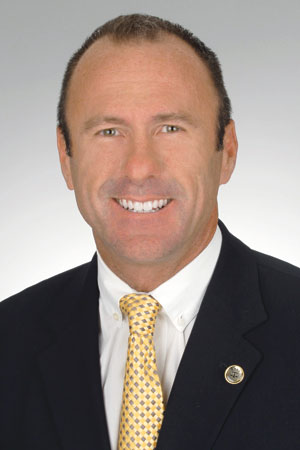Jessica Lynn’s ex-wife is trying to terminate her parental rights in Collin County court, arguing that visitation would be dangerous to 13-year-old’s mental health

FINALLY READY
Jessica Lynn said her ex-wife knew about her feelings of being trapped in the wrong body since before they were married. Lynn even planned to transition before they wed, but her ex got pregnant, so they married and she lived as a husband and father. Lynn admits she thought her youngest was too young to discuss her transition when he was 10, but she said she thinks it’s time now. (Terry Thompson/Dallas Voice)
PLANO — Jessica Lynn hasn’t seen her youngest son in three years.
The separation was helpful while Lynn, who lives in California, transitioned after her ex-wife moved to Plano to be near family in 2009.
But now Lynn has completed her transition, having had gender reassignment surgery in 2010, and she thinks enough time has passed to tell her
13-year-old that his father is now a woman.
“I’m happy. I’m content,” Lynn said. “I would like to see my son.”
But Lynn’s decision to tell her son the truth prompted her ex-wife to file paperwork about a month ago seeking to terminate Lynn’s parental rights on grounds of emotional abuse and abandonment.
In an affidavit filed by Lynn’s ex-wife for a temporary restraining order in Collin County family court, she writes that the child “is not aware of the sex change of his father” and that Lynn’s threat to come to Texas to “exercise visitation” would have an “irreparable” emotional impact and be “dangerous to the mental health and emotional well-being” of their son.
J. Ryan Nordhaus, the attorney representing Lynn’s ex, did not return calls seeking comment. The name of Lynn’s ex is being withheld to protect the privacy of their children, who have the same surname as their mother.
After Dallas Voice contacted Nordhaus, he filed for a gag order about the case, which has since been issued, preventing the parties from further discussing the matter publicly, according to Lynn’s attorney, John McCall Jr.
McCall and other experts say there’s little case law on custody and transgender parents in Texas, but situations like Lynn’s are expected to become increasingly common as more transgender parents decide to live authentic lives and fight for parental rights.
Putting fatherhood first
Lynn and her ex married in California in 1991 and divorced five years later. Two boys, now 19 and 21, were a product of that relationship. Their youngest son was born after the two reconnected several years later.
Lynn said her ex knew about her feelings of being trapped in the wrong body since before they were married. Lynn had decided to transition before they wed, but her ex got pregnant, so they married and she lived as a husband and a father. Then Lynn was going to transition again when the two reconnected, but her ex became pregnant with her youngest son, and she again put her transition on hold.
Lynn said the couple shared custody of the two older boys when they divorced and later bought a house together when their third son was on the way.
But after three years, she said her ex left and took all three boys with her, leading to a four-year custody battle.
The custody hearings ended in 2007 with Lynn granted primary custody, but the couple shared responsibly in raising the boys. They then reunited as friends and Lynn began discussing her transition with her ex, who expressed support, she said.
A family in transition
In 2009, Lynn’s ex moved to Plano to be near family, but the oldest son stayed in California with Lynn. While Lynn maintained a close relationship with her other sons, with phone calls to her youngest and the middle son coming to California a few times to see her, she wanted to tell her youngest who she really was.
Lynn admits she thought her son was too young to discuss her transition when he was 10, but she said she thinks it’s time now.
“I wanted to get to a certain point before visits,” Lynn said. “I think he was ready about a year or so ago.”
Although there is little case law on the subject in Texas, Lynn’s predicament is not unique among trans parents.
Meghan Stabler, a trans board member for the Human Rights Campaign board who lives in Round Rock, said she went through a long divorce with her ex-wife. Stabler said her ex argued that because she was transgender, allowing her to have joint custody would constitute emotional abuse to their daughter.
She said that while her daughter knew about her transition, judges sided with her ex for custody during the legal process and allowed her ex to take their daughter to live overseas. The distance tied up the custody and divorce for years.
“They thought what I was doing was cruel and unreasonable,” she said.
By the time the divorce was final, Stabler’s daughter was no longer a minor, but she said the two maintained a close relationship despite the distance with annual visits.
Stabler said she knows many people who fear losing their children when they transition, but tells them to try to resolve custody before they transition.
She said the issue lies more with the exes and not with the kids, who still love their parent.
“I’ve seen a lot of people who transition with fear that they’ll lose their kids,” she said. “It just takes a little bit of extra time, but a kid really looks past what is happening and sees the love of the parent.”
Uncharted territory
McCall said there are no grounds to terminate Lynn’s parental rights because they can’t prove abandonment or emotional abuse because she’s maintained a relationship with her son.
Although there is little case law on transgender custody battles in Texas, McCall said the Texas Family Code is clear in its protection of parental rights in a safe environment.
“There’s not any case law in Texas on transgender custody,” he said. “The family law protects parents, and you’re looking at a parent. …This case is like any other. We have two parents fighting over a child who love this child.”
McCall said Lynn’s situation is similar to someone who’s had an amputation and appears vastly different afterward.
He said time and sensitivity are needed before telling the person’s children, but the person is still the same parent the children knew before the change.
“Jessica is no different than anyone who’s had dramatic changes to their body,” he said. “They’re still the same person.”
Angela Oaks, a Houston family law attorney, has only handled one transgender custody case, which involved a divorce. She said the father was transitioning and the mother was fighting to prevent him from having custody. But the children, ages 6, 10 and 14, all knew about his transition and the judge ultimately sided with the father.
Oaks said Lynn’s case is an enforcement issue because she was granted primary custody in a former custody battle and being trans doesn’t mean her parenting has changed.
“Somebody, whether it was a judge or a jury, looked at these two parents and decided that dad, male at the time, was the best parent,” she said. “That didn’t have anything to do with the sex at the time. That had to do with his parenting ability. And now that dad is a woman, her parenting ability hasn’t changed.”
Oaks handles a lot of same-sex parent cases where one parent isn’t biologically related to the child and has to prove their standing. But she said Lynn will always be her son’s father.
“Dad is always going to be dad, no matter whether dad is male or female,” she said.
But while there are several cases for same-sex custody battles, “there’s just nothing out there for transgender,” Oaks said.
“I don’t know if transgender parents are just now deciding that society is ready to take on these cases,” she said. “And before they just said, ‘OK, if I transition now, I have to lose my children.’ So either they did that or they didn’t transition.”
Visitation on hold
Lynn will continue to have unlimited phone access to her son until the case is determined, and she’s offered to pay for a counselor to help tell her son about her new identity.
McCall said the next step is unclear because Lynn will have to be evaluated by a clinical psychologist to determine whether she’s mentally stable to have access to her son. He said the earliest they would reappear in court would likely be January because of the holidays and the court process.
But he said it may come down to needing an attorney or therapist to represent the son to determine if he is mature enough or ready to learn about his father. And eventually, the lawyers will work out a plan for visitation.
“At some point the kid is going to learn about his dad,” McCall said.
Oaks said Lynn’s defense should focus on the child instead of her being trans. She said telling the child with counseling is better than completely removing a parent from her son’s life.
“Take the transgender issue out of the spotlight and focus it back on the best interest of the child and how the child needs two parents,” Oaks said.
“Male or female, that child is going to lose out if they don’t know their parent.”
Lynn said she doesn’t want to rush telling her son, adding that she thinks he’s old enough and she feels confident now that her transition is complete to see him.
“I love him to death and I miss him,” Lynn said. “It’s time to tell him.”
This article appeared in the Dallas Voice print edition November 16, 2012.


















